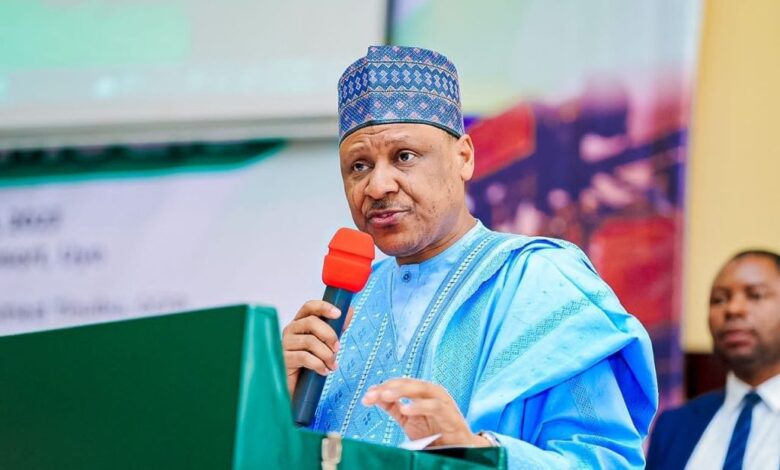The Cybercrime Prevention and Prohibition Amendment Act of 2024’s proposed cybersecurity levy, as suggested by the Central Bank of Nigeria (CBN), has been removed, along with the circular requiring banks and payment service providers to collect and remit it.
The Central Bank of Nigeria (CBN) has issued a revised circular, dated May 17, 2024, outlining new guidelines for cash-based transactions. The circular, signed by Chibuzor Efobi, Director of Payment Systems Management, and Haruna Mustafa, Director of the Financial Policy and Regulation Department, was addressed to commercial banks, Payment Service Providers (PSPs), non-interest banks, and other stakeholders.
The circular introduces a ‘cash handling charge’ on daily cash withdrawals, aimed at promoting a cashless economy and reducing the reliance on physical cash. The CBN has also set limits on cash withdrawals and deposits and has introduced measures to encourage electronic payments and reduce the cost of cash management.
Read also: Federal Gov’t Suspends Controversial 0.5% Cybersecurity Levy
This policy update is part of the CBN’s ongoing efforts to promote financial inclusion, reduce the burden of cash handling, and enhance the overall efficiency of the Nigerian payment system. The CBN aims to promote a more sustainable and efficient financial system by encouraging electronic payments and reducing cash transactions.
The withdrawal comes after the Federal Executive Council decided to stop the law’s implementation, citing the need for further research.
CBN Introduces Cyber Security Levy on Electronic Transactions
As a reminder, on May 6, 2024, the Central Bank of Nigeria (CBN) issued a circular directing commercial banks, Payment Service Providers (PSPs), and other stakeholders to commence the collection and remittance of a 0.5% cyber security levy on the transaction cost of electronic transactions. This directive is based on the amended 2024 Cybercrimes Prohibition and Prevention Act provisions.
The circular mandates financial institutions to deduct the cyber security levy from the transaction cost of all electronic transactions, including online payments, mobile banking, and point-of-sale transactions. The levy aims to enhance the country’s cyber security infrastructure and combat the rising threat of cybercrimes in the financial sector.
By implementing this directive, the CBN seeks to strengthen the security of electronic transactions, protect consumers’ financial data, and promote a safer and more secure digital payment ecosystem in Nigeria. The cyber security levy is a proactive measure to address the growing risk of cyber threats and ensure the integrity of the country’s financial system.
Cyber levy raises inflation fear
The top bank further warned that violation will result in penalties as outlined in the modified Cyber Crimes Prohibition and Prevention Act. This penalty entails a fine equal to 2% of the failing business’s turnover, among other sanctions.
Nigerians, who felt that the charge’s timing was incorrect and would increase operational costs for their country’s enterprises, took offence at its introduction. According to the Centre for the Promotion of Public Enterprise (CPPE), the new tax will worsen the effects of inflation and hinder the growth of businesses nationwide. The Nigerian Association of Chambers of Commerce, Industry, Mines, and Agriculture (NACCIMA) has further urged the Federal Government and the Central Bank of Nigeria (CBN) to set a maximum limit of N500 for the newly introduced cybersecurity levy to alleviate the financial burden on the private sector.
The federal government announced the levy’s suspension pending a future review by the Minister of Information in response to Nigerians’ concerns and complaints. Despite passing the amended act that established the levy, the federal House of Representatives also demanded that it be suspended.
The Cybercrime Prevention and Prohibition Amendment Act of 2024’s proposed cybersecurity fee, as suggested by the Central Bank of Nigeria (CBN), has been removed, along with the circular requiring banks and payment service providers to collect and remit it.
The Central Bank of Nigeria (CBN) has issued a revised circular, dated May 17, 2024, outlining new guidelines for cash-based transactions. The circular, signed by Chibuzor Efobi, Director of Payment Systems Management, and Haruna Mustafa, Director of the Financial Policy and Regulation Department, was addressed to commercial banks, Payment Service Providers (PSPs), non-interest banks, and other stakeholders.
The circular introduces a ‘cash handling charge’ on daily cash withdrawals, aimed at promoting a cashless economy and reducing the reliance on physical cash. The CBN has also set limits on cash withdrawals and deposits and has introduced measures to encourage electronic payments and reduce the cost of cash management.
This policy update is part of the CBN’s ongoing efforts to promote financial inclusion, reduce the burden of cash handling, and enhance the overall efficiency of the Nigerian payment system. The CBN aims to promote a more sustainable and efficient financial system by encouraging electronic payments and reducing cash transactions.
The withdrawal comes after the Federal Executive Council decided to stop the law’s implementation, citing the need for further research.
CBN Introduces CyberSecurity Levy on Electronic Transactions
As a reminder, on May 6, 2024, the Central Bank of Nigeria (CBN) issued a circular directing commercial banks, Payment Service Providers (PSPs), and other stakeholders to commence the collection and remittance of a 0.5% cyber security levy on the transaction cost of electronic transactions. This directive is based on the amended 2024 Cybercrimes Prohibition and Prevention Act provisions.
The circular mandates financial institutions to deduct the cyber security levy from the transaction cost of all electronic transactions, including online payments, mobile banking, and point-of-sale transactions. The levy aims to enhance the country’s cyber security infrastructure and combat the rising threat of cybercrimes in the financial sector.
By implementing this directive, the CBN seeks to strengthen the security of electronic transactions, protect consumers’ financial data, and promote a safer and more secure digital payment ecosystem in Nigeria. The cyber security levy is a proactive measure to address the growing risk of cyber threats and ensure the integrity of the country’s financial system.
Read also: Morocco ranks 55th in global Cybersecurity rating
Cyber levy raises inflation fear
The top bank further warned that violation will result in penalties as outlined in the modified Cyber Crimes Prohibition and Prevention Act. This penalty entails a fine equal to 2% of the failing business’s turnover, among other sanctions.
Nigerians, who felt that the charge’s timing was incorrect and would increase operational costs for their country’s enterprises, took offence at its introduction. According to the Centre for the Promotion of Public Enterprise (CPPE), the new tax will worsen the effects of inflation and hinder the growth of businesses nationwide. The Nigerian Association of Chambers of Commerce, Industry, Mines, and Agriculture (NACCIMA) has further urged the Federal Government and the Central Bank of Nigeria (CBN) to set a maximum limit of N500 for the newly introduced cybersecurity levy to alleviate the financial burden on the private sector.
The federal government announced the levy’s suspension pending a future review by the Minister of Information in response to Nigerians’ concerns and complaints. Despite passing the amended act that established the levy, the federal House of Representatives also demanded that it be suspended.


